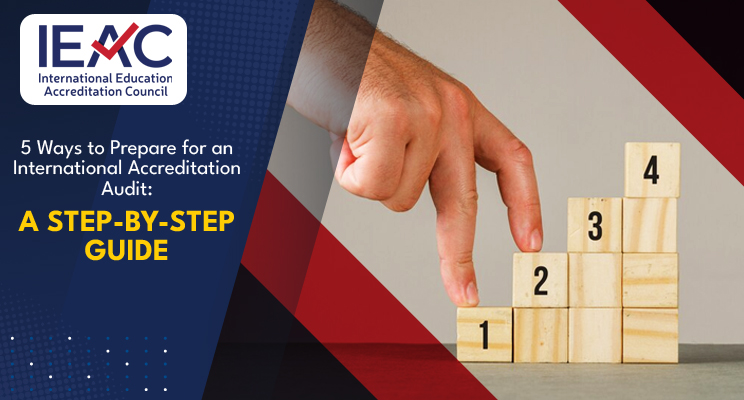- Home
- About IEAC
- Accreditation
- University Accreditation
- College Accreditation
- Online Institution Accreditation
- School Accreditation
- University Recruitment Agency Accreditation
- Programmatic Accreditation
- Teacher/ Lecturer Accreditation
- Religious Institutes Accreditation
- Affiliate Accreditation
- Research Accreditation Candidacy Accreditation
- IEAC Membership
- Institutions Accredited
- Accreditation Process
- Contact Us Webinar Apply Now
Blog
5 Ways to Prepare for an International Accreditation Audit: A Step-by-Step Guide
Lorem ipsum dolor sit amet, consectetur adipiscing elit, sed do eiusmod tempor incididunt ut labore et dolore magna aliqua. Quis ipsum suspendisse ultrices gravida. Risus commodo viverra maecenas accumsan lacus vel facilisis.

5 Ways to Prepare for an International Accreditation Audit: A Step-by-Step Guide
Gaining international accreditation is a major milestone for any institution or organization. It validates the quality of services, operations, or education you provide, boosts credibility, and opens doors for global recognition. However, preparing for an international accreditation audit can be a rigorous process. It demands careful planning, internal evaluation, and an unwavering commitment to meeting global standards.
If your organization is getting ready for an accreditation audit, this guide will help you streamline the preparation process. Here are five essential steps to get audit-ready:
1. Understand the Accreditation Standards Thoroughly
Why it matters:
Each accrediting body, whether it’s educational, healthcare-related, or corporate, has its own detailed set of standards and criteria. You cannot prepare adequately if you don't fully understand what is being assessed.
Action Steps:
- Study the official guidelines and handbooks provided by the accrediting body.
- Attend webinars or training sessions offered by the accreditation agency, if available.
- Form a dedicated committee that will focus on understanding, interpreting, and disseminating the standards to relevant departments.
- Clarify ambiguities early. If there are any unclear points in the criteria, seek clarification from the accrediting agency directly rather than making assumptions.
Pro Tip: Create a standards checklist mapped against your current processes to immediately identify gaps.
2. Conduct a Comprehensive Self-Assessment
Why it matters:
A self-assessment mirrors the audit process and gives you a chance to identify strengths and weaknesses before the official team arrives.
Action Steps:
- Use the standards checklist to conduct an honest, detailed internal audit.
- Interview department heads, faculty, or team leaders to gather insights into real practices versus documented policies.
- Evaluate documentation, processes, and outcomes against each standard.
- Prepare a Self-Study Report (SSR) if required—this document often becomes the cornerstone of the accreditation review.
Pro Tip: Treat this as a real audit. Be as critical as an external auditor would be. The goal is not to present a perfect picture but to uncover areas that need urgent attention.
3. Strengthen Documentation and Evidence
Why it matters:
Accreditors don't just take your word for it; they require hard evidence. Good documentation can make or break your audit performance.
Action Steps:
- Organize all policy documents, minutes of meetings, student records, performance data, and feedback reports systematically.
- Update outdated documents and ensure that all records are consistent and up-to-date.
- Set up a digital document repository that makes access and retrieval easy during the audit.
- Map every document to the corresponding standard to ensure nothing is missed.
Pro Tip: Label and catalog documents clearly. Auditors appreciate easy navigation, and it reflects well on your organization’s efficiency.
4. Train and Prepare Your Team
Why it matters:
An accreditation audit often involves interviews and site visits. Every member of your organization should be able to speak confidently and accurately about their role in achieving standards.
Action Steps:
- Conduct orientation sessions to brief everyone on the purpose and scope of the audit.
- Run mock interviews or mock audits with selected departments.
- Coach key personnel (leaders, faculty heads, department supervisors) on how to present data, processes, and results clearly.
- Create quick-reference guides or cheat sheets summarizing key points for teams.
Pro Tip: Stress the importance of honesty. Accreditors value transparent answers more than rehearsed perfection.
5. Create a Crisis-Response and Follow-up Plan
Why it matters:
Even with the best preparations, unforeseen questions or issues may arise during the audit. Having a plan to address concerns quickly can leave a positive impression.
Action Steps:
- Designate a small "response team" who can quickly gather additional information or documentation if auditors request it.
- Practice calm, professional communication strategies for handling unexpected queries.
- After the audit, hold a debriefing session to capture feedback and lessons learned.
- Prepare for next steps, whether that involves addressing minor non-conformities or implementing continuous improvement initiatives.
Pro Tip: Keep a printed and digital “Audit Response Kit” ready with common extra materials like organizational charts, updated reports, and key c
contacts.
Final Thoughts
Preparing for an international accreditation audit is not just about passing a test—it’s about embedding a culture of quality, accountability, and continuous improvement throughout your organization. When approached with diligence and sincerity, the preparation process itself can be transformative.
By thoroughly understanding standards, honestly assessing your operations, organizing clear documentation, training your team, and preparing for the unexpected, you significantly boost your chances of a successful outcome.
Remember: Accreditation is a journey, not a one-time event. A successful audit preparation lays a strong foundation for future excellence and innovation.






